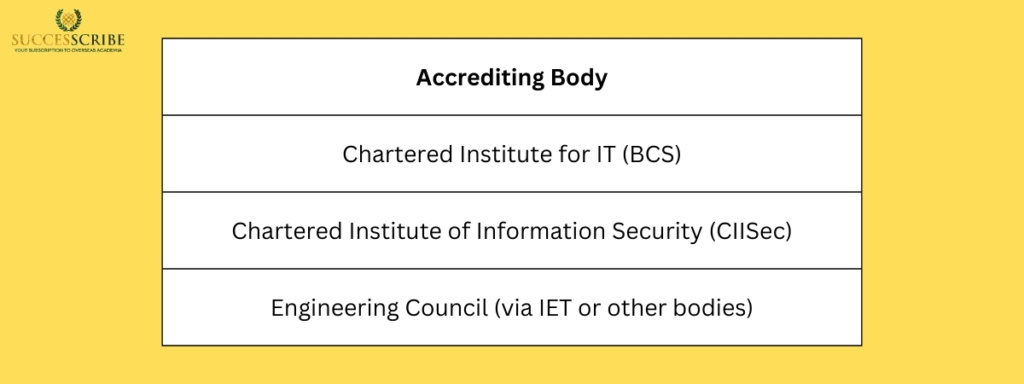In an increasingly digital world, where a new cyber attack occurs every 39 seconds and the global annual cost of cybercrime is predicted to reach $10.5 trillion USD by 2025, the role of the cyber defender has never been more critical. Nations and corporations are in a relentless arms race against threat actors, creating an unprecedented demand for skilled professionals. If you are looking to position yourself at the forefront of this dynamic field, pursuing a Master’s in Cyber Security in the United Kingdom is one of the most strategic decisions you can make.
Key Highlights: Masters in Cyber Security in UK
| Category | Details |
| Program Duration | 1 year (full-time) / 2–3 years (part-time or online) |
| UK Cyber Security Market Size | £10.5 billion (2023), projected to reach £14 billion by 2027 (10% CAGR) |
| Top Universities | UCL, Royal Holloway, University of Warwick, University of Southampton, Lancaster University, University of Glasgow, University of Surrey, University of Birmingham, University of Sheffield |
| Global Ranking Range | Universities rank between Top 10–250 globally (e.g., UCL #45, Warwick #67, Glasgow #74) |
| Tuition Fees | £18,000 – £32,000 per year (depending on university) |
| Living Costs | £10,000 – £20,000 annually (city dependent; London highest, £15,000–£20,000) |
| Admission Requirements | 2:1 honours degree in CS/IT/Engineering/Maths (some accept 2:2 + experience); non-CS backgrounds accepted for conversion MSc |
| English Proficiency | IELTS 6.5 (6.0 in each band) / TOEFL 88–90 / PTE 61+ (waivers possible) |
| Technical Skills Preferred | Programming (Python, Java, C/C++), operating systems, networking basics |
| Course Structure | Core modules: Cryptography, Network Security, Secure Software Development, Ethical Hacking, Forensics, Incident Response, Risk & Compliance, Cloud/IoT Security (electives); Labs + Dissertation/Industry project |
| Top Hiring Sectors | Finance (25%), Government & Defense (20%), Healthcare (15%), Tech (12%), Energy (8%) |
| Average Salaries | Entry: £35,000–£45,000 |
| Scholarships (Government) | Chevening (full funding), Commonwealth Master’s (full funding), GREAT (£10,000), British Council Women in STEM |
| Scholarships (Universities) | UCL Global Masters (£15,000), Warwick Chancellor’s (full tuition + stipend), Southampton Merit (£3,000–£9,000), Lancaster Global (£5,000–£10,000), Glasgow Excellence (£5,000–£10,000), Coventry Pathways (£3,000) |
Suggested Post: Sample LOR for Study abroad program
Why study a Masters in Cyber Security in the UK?

A Masters in Cyber Security in UK equips students with cutting-edge skills while giving them access to one of the most advanced and supportive cyber ecosystems in the world:
- Concentrated industry and research strength – world-class research at institutions such as Oxford, Cambridge, Royal Holloway, and others produce practical tools and published findings used globally.
- Strong employer demand – the UK government and private sectors actively recruit cyber specialists, from SOC analysts to threat hunters and cloud-security engineers. Recent government reporting highlights continuing sector growth and job creation.
- Government-backed accreditation – the UK’s National Cyber Security Centre (NCSC) certifies specific master’s degrees that meet employer needs and academic quality, which improves employability.
- Post-study work routes – the Graduate Route (post-study work visa) allows eligible graduates to remain and work in the UK for two years after completing their degree (three for PhDs), giving time to transition into employment.
- Diverse learning formats – 1-year full-time master’s programmes (typical), part-time, distance learning and conversion programmes (for non-CS backgrounds).
Top Universities for Masters in Cyber Security in UK
Studying a Masters in Cyber Security in UK at leading universities means learning from top academics while gaining exposure to employers actively seeking skilled cyber professional. The UK is home to several globally recognized universities offering industry-relevant MSc Cyber Security programs. Many of these are accredited by the NCSC (National Cyber Security Centre) and have strong research and industry links.
| University | Ranking | Program Name | Tuition Fees |
| University College London (UCL) | #9 (UK), #45 (Global) | MSc Information Security | £31,100 |
| Royal Holloway, University of London | #29 (UK), #402 (Global) | MSc Information Security | £25,200 |
| University of Warwick | #10 (UK), #67 (Global) | MSc Cyber Security Engineering | £29,950 |
| University of Southampton | #16 (UK), #80 (Global) | MSc Cyber Security | £28,000 |
| Lancaster University | #15 (UK), #122 (Global) | MSc Cyber Security | £27,000 |
| University of Glasgow | #11 (UK), #74 (Global) | MSc Cyber Security | £26,500 |
| University of Surrey | #22 (UK), #244 (Global) | MSc Information Security | £25,400 |
| University of Birmingham | #13 (UK), #84 (Global) | MSc Cyber Security | £27,540 |
| University of Sheffield | #18 (UK), #104 (Global) | MSc Cyber Security and Artificial Intelligence | £26,200 |
Typical Course Structure & Modules (1-Year MSc in Cyber Security, UK)
The structure of a Masters in Cyber Security in UK combines academic study with industry-focused projects, ensuring graduates leave with practical skills ready for the job market.
| Stage | Modules / Focus Areas | What You’ll Learn / Do |
| Semester 1 (Foundations) | – Cryptography & Network Security- Secure Software Development- Operating Systems & Security Fundamentals | Build a strong base in security principles, secure coding, and how systems/networks operate. |
| Semester 2 (Specialisation & Application) | – Ethical Hacking & Penetration Testing- Incident Response & Threat Detection- Digital Forensics & Cyber Law- Risk Management, Governance & Compliance- Cloud & IoT Security (electives at some universities) | Gain hands-on skills in offensive & defensive techniques, security policies, legal frameworks, and emerging tech security. |
| Practical Labs (Throughout year) | – Security Operations Centre (SOC) simulations- Malware analysis labs- Capture the Flag (CTF) competitions- Realistic case studies with industry tools (e.g., SIEM, IDS/IPS) | Apply theory in real-world scenarios using industry-grade tools and environments. |
| Summer Term / Dissertation | – Research Dissertation- Industry-linked project (with company collaboration in many universities) | Independent research or applied project that demonstrates deep expertise. Often linked to industry problems for employability. |
Admission Requirements for the Master Cyber Security Program in the UK
Getting into a UK master’s in cyber security requires meeting both academic and language standards. While requirements vary slightly by university, here’s what most institutions look for:
| Requirement Area | Details |
| Academic Qualification | – A UK 2:1 honours degree (or equivalent) in Computer Science, IT, Software Engineering, Electronics, or Mathematics.- Some universities accept a 2:2 with strong professional experience.- For conversion MSc programmes, applicants with other backgrounds (e.g., business, physics) may be accepted if they show programming/IT interest. |
| Work Experience | – Not always required, but 1–2 years in IT, cyber, or related tech roles strengthens the application.- For career changers, relevant certifications (e.g., CompTIA Security+, CEH) can be useful. |
| Technical Skills | – Basic knowledge of programming (Python, Java, C/C++), operating systems, and networks.- Some universities may set coding or technical interviews for applicants from non-CS backgrounds. |
| English Language Proficiency | – IELTS Academic: typically 6.5 overall (with at least 6.0 in each band).- TOEFL iBT: around 88–90 overall.- PTE Academic: usually 61 or above.- Waivers available if you studied in English-medium institutions (check university policy). |
| Documents Needed | – Academic transcripts & degree certificates.- Personal statement (highlighting interest in cyber security, projects, career goals).- CV/Resume (technical projects, work experience).- 1–2 references (academic or professional). |
| Application Timeline | – Applications open: usually September–October of the year before intake.- Deadlines: vary by university, but international students should apply 6–9 months early to secure a seat, scholarships, and visa.- Many universities review applications on a rolling basis until spots fill. |
Studying in the UK – Visas & post-study work
- Student visa: required for international students; you must show you have an unconditional offer, TB test (if applicable), funds for tuition and living costs (amount depends on location), and meet English language rules.
- Graduate Route: After completing a qualifying course, international students can apply to stay up to 2 years to work or look for work (3 years for PhD). This is a major advantage for gaining UK work experience after a masters.
- Work eligibility while studying: Typically up to 20 hours/week during term time.
UK Cyber Security Job Market: Demand, Size & Growth
Graduates of a Masters in Cyber Security in UK enter a thriving job market where demand for specialists in cloud, AI, and data security is growing faster than ever.
| Factor | Key Insights | Growth Outlook |
| Market Size | UK cyber security market valued at £10.5 billion (2023), with steady year-on-year expansion. | Expected to exceed £14 billion by 2027 (CAGR 10%). |
| Workforce Demand | Over 160,000 cyber professionals currently employed in the UK | Industry faces a skills gap of 11,200 professionals annually, leaving many vacancies unfilled. |
| Top Hiring Sectors | Finance & Banking (25%), Government & Defense (20%), Healthcare (15%), Technology (12%), Energy (8%). | Continuous demand across critical infrastructure sectors. |
| Job Openings | In 2024 there were 160,035 job postings in cyber security across the UK. | Projected to rise 15–20% by 2026, especially for cloud and AI-related security roles. |
| Average Salary Range | Entry-level: £35,000–£45,000Mid-level: £50,000–£75,000Senior: £80,000–£120,000+ | Salaries are growing at 5–7% annually due to demand-supply imbalance. |
| Regional Hotspots | London, Manchester, Birmingham, Edinburgh, and Belfast lead in cyber job creation. | Regional hubs are expanding with government investment in cyber clusters. |
| Skills in High Demand | Cloud Security, Network Defense, Penetration Testing, Incident Response, Cyber Risk Management, AI-driven Security. | Future demand to focus on AI security, cloud, and zero-trust frameworks. |
Career Paths & Roles After a Master’s in Cyber Security in the UK
An MSc in Cyber Security from the UK opens doors to high-demand careers across industries like finance, government, defense, healthcare, IT, and consulting. With the UK cyber market projected to grow to £14+ billion by 2027, career opportunities are both diverse and lucrative.
Core Career Paths
| Career Path | Typical Roles | Who is it for? |
| Technical Security | Cyber Security Analyst, Penetration Tester, Network Security Engineer | Students strong in coding, networks, and system defense. |
| Policy & Governance | Information Security Manager, Risk Analyst, Compliance Officer | Students interested in security regulations, standards (ISO 27001, GDPR). |
| Incident Response & Forensics | Incident Response Specialist, Digital Forensics Investigator | Students skilled in threat detection, forensic analysis, and crisis management. |
| Research & Development | Security Researcher, AI Security Specialist, Cryptographer | Students aiming for innovation, PhD research, or academic careers. |
| Leadership & Strategy | Security Consultant, CISO (Chief Information Security Officer) | Students with management ambitions and strong leadership skills. |
Cyber Security Careers in the UK: Job Roles & Salaries

Holding a Masters in Cyber Security in UK opens doors to high-paying roles in sectors like finance, healthcare, defense, and technology.
| Job Role | Typical Salary (Entry-Level) |
| Cyber Security Analyst (SOC Analyst) | £28,000 – £40,000 |
| Penetration Tester (Ethical Hacker) | £35,000 – £45,000 |
| Security Consultant | £40,000 – £55,000 |
| Network Security Engineer | £32,000 – £45,000 |
| Cloud Security Specialist | £40,000 – £50,000 |
| Incident Response Specialist | £38,000 – £50,000 |
| Information Security Manager | £45,000 – £60,000 |
| Chief Information Security Officer (CISO) | £90,000 – £120,000 |
| Digital Forensics Expert | £30,000 – £42,000 |
| AI & Machine Learning Security Specialist | £45,000 – £60,000 |
Tuition Fees for Masters in Cyber Security in UK

The investment in a Masters in Cyber Security in UK varies, but the strong return on employability and career opportunities makes it worthwhile.
| Type of University | Tuition Fee Range (per year) |
| Public Universities (e.g., University of Glasgow, Lancaster, Warwick) | £20,000 – £28,000 |
| Top-ranked Universities (e.g., UCL, University of Southampton) | £25,000 – £32,000 |
| Affordable Universities (e.g., University of West London, Coventry University) | £15,000 – £20,000 |
| Average Across the UK | £18,000 – £27,000 |
City-wise Average Living Costs
| City | Annual Living Costs | Notes |
| London | £15,000 – £20,000 | Most expensive, higher rent & transport. |
| Manchester | £11,000 – £14,000 | Popular student hub, cheaper than London. |
| Birmingham | £10,500 – £13,500 | Affordable accommodation. |
| Edinburgh | £12,000 – £15,000 | Slightly higher costs due to housing demand. |
| Leeds/Sheffield/Nottingham | £10,000 – £13,000 | Student-friendly with lower rent. |
Total Cost of Study (Tuition + Living)
| Type of University & Location | Annual Cost (approx.) |
| Affordable University in smaller city | £25,000 – £32,000 |
| Mid-range University in major city | £30,000 – £38,000 |
| Top University in London | £40,000 – £50,000 |
Scholarships for MSc Cyber Security in UK
Funding a Master’s in Cyber Security in the UK doesn’t have to be a financial burden. With the cybersecurity industry booming, generating £13.2 billion in revenue in 2025 and a global shortage of 4 million professionals, scholarships are plentiful to attract talent
Government & National Scholarships
| Scholarship | Funding Amount | Eligibility Highlights |
| Chevening Scholarships | Full tuition + living allowance + travel costs | Outstanding academic background, leadership potential, 2+ years’ work experience. |
| Commonwealth Master’s Scholarships | Full tuition + monthly stipend + airfare | Students from Commonwealth countries (including India), with strong academic merit. |
| British Council Women in STEM Scholarships | Full tuition + stipend + travel | For female students pursuing STEM subjects like cyber security. |
| GREAT Scholarships (UK Government + Universities) | £10,000 towards tuition fees | Available to Indian students and others from selected countries. |
University-Specific Scholarships
| University | Scholarship Name | Value | Notes |
| University College London (UCL) | UCL Global Masters Scholarship | £15,000 | For international master’s students with financial need. |
| University of Warwick | Warwick Chancellor’s International Scholarship | Up to full tuition + stipend | Highly competitive; for outstanding academic records. |
| University of Southampton | Southampton International Merit Scholarship | £3,000 – £9,000 | Based on academic excellence. |
| Lancaster University | Global Scholarship | £5,000 – £10,000 | Automatic consideration for international applicants. |
| University of Glasgow | School of Computing Science Excellence Award | £5,000 – £10,000 | For high-achieving MSc applicants in computing & cyber. |
| Coventry University | International Pathways Scholarship | £3,000 | Open to all international master’s applicants. |
Other Funding Options
- External Scholarships: Commonwealth Split-Site, Inlaks Shivdasani Foundation (for Indian students), and DAAD-UK collaboration grants.
- Part-time Work: International students can work up to 20 hours/week during term and full-time during holidays.
- Research Funding: Some universities offer assistantships in cyber security research labs.
Accreditation & Industry Recognition for MSc Cyber Security in the UK

When choosing a Masters in Cyber Security in UK, accreditation and industry recognition play a big role in ensuring that the degree is respected by employers worldwide.
NCSC Certification (UK’s Gold Standard)
The National Cyber Security Centre (NCSC), part of GCHQ (UK’s intelligence and cyber security agency), certifies certain MSc Cyber Security programs.
| Why it Matters | Benefits for Students |
| NCSC sets the highest standards in cyber education. | Employers instantly recognize NCSC-certified courses as top quality. |
| Ensures teaching is aligned with real-world security challenges. | Stronger career prospects in UK government, defense, and private sectors. |
| Programs cover areas like network defense, cryptography, risk management, and incident response. | Access to NCSC events, research collaborations, and cyber security networks. |
Example universities with NCSC-certified MSc Cyber Security courses: University of Southampton, Lancaster University, University of Warwick, University of Glasgow, and Royal Holloway, University of London.
Professional & Industry Accreditation
| Accrediting Body | Recognition | Value for Students |
| Chartered Institute for IT (BCS) | Accreditation of computing and IT-related degrees. | Pathway to Chartered IT Professional (CITP) status. |
| Chartered Institute of Information Security (CIISec) | Endorses programs that meet professional cyber skills frameworks. | Enhances employability in the UK cyber security sector. |
| Engineering Council (via IET or other bodies) | Some MSc Cyber Security courses are accredited as part of engineering disciplines. | Supports Chartered Engineer (CEng) applications. |
Conclusion
Is a Master’s in Cyber Security in the UK Right for You?
Absolutely, if you’re passionate about safeguarding the digital world. With £13.2 billion in sector value and salaries starting at £38k, the ROI is clear. Whether your ambition is to become a penetration tester, incident response specialist, security consultant, or even a future CISO, a Masters in Cyber Security in UK provides the knowledge, skills, and recognition needed to thrive. For aspiring cyber professionals, this degree is not just an academic qualification, it is a career investment with long-term rewards in employability, salary potential, and global impact.
FAQs
How much does it cost to study Cyber Security in UK?
The tuition fees for a Cyber Security in UK typically range from £18,000 to £32,000 per year, depending on the university. Living expenses add around £10,000–£20,000 annually, depending on the city.
How long is a MS in Cyber Security in UK?
Most programs are 1 year full-time. However, many universities also offer part-time or online study options, which can take 2–3 years.
What career opportunities are available after a MS in Cyber Security in UK?
Graduates can pursue roles such as cyber security analyst, penetration tester, incident response specialist, cloud security engineer, and CISO. Salaries start around £35,000–£45,000 and can rise to £120,000+ for senior roles.
Which universities are best for Masters in Cyber Security in UK?
Top universities include UCL, Royal Holloway, University of Warwick, University of Southampton, Lancaster University, University of Glasgow, and University of Birmingham, many of which have NCSC-certified programs
Is IELTS mandatory for Msc Cyber Security in UK?
Most universities require IELTS (6.5 overall) or equivalent tests like TOEFL/PTE. However, applicants who studied in English-medium institutions may qualify for an exemption.
Related Post
Masters in Data Science in UK
Masters in Artificial Intelligence in UK
Msc robotics eligibility in UK
Best universities for MBA in UK















